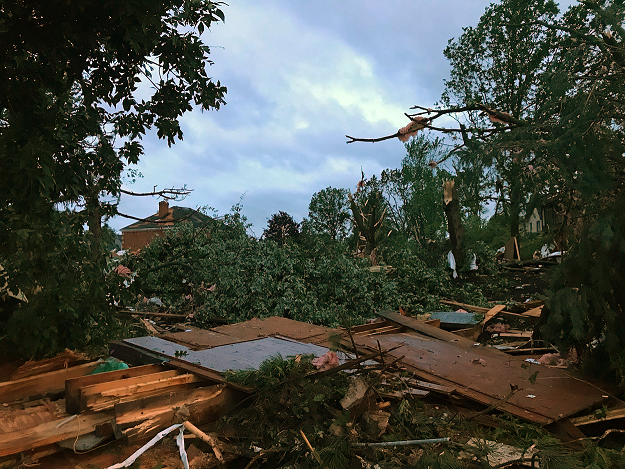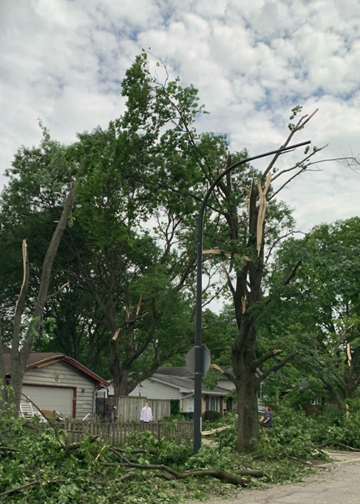
Three destructive tornadoes are said to have blown through multiple counties in Southern Illinois and Northeastern Indiana late June 20 and early June 21, 2021. Winds in excess of 140mph left more than 211,000 people without electricity across Illinois, Indiana, Michigan, Missouri and Ohio, according to PowerOutage.US.
At least 9 people were injured, with one Naperville woman suffering from critical injuries. 16 homes were also left “uninhabitable”, displacing families to temporary shelters. Dozens more homes suffered damage.
Although the tornadoes have passed, they’ve left residents in Chicago, Illinois and South Haven, Indiana suburbs in a state of disarray among potentially hazardous conditions. To help you and your family avoid a post-tornado injury in Illinois and Indiana, Lerner and Rowe Injury Attorneys has put together this list of post-tornado safety tips.
Drive with Caution to Avoid a Post-Tornado Injury
Many roads have reopened, having been cleared of tornado-thrown construction debris, broken trees, downed power lines, and displaced vehicles. Even so, we highly suggest continuing to drive with caution and look out for less obvious and potentially dangerous debris on the road that may cause a tire blowout or result in a car accident.
Ultimately, limiting the amount of driving you do over the next few days is one of the best ways to avoid a post-tornado injury in Illinois or Indiana.
Watch for Broken Tree Branches

Tornadoes can cause significant tree damage by snapping limbs and causing root damage that forces a tree to topple over. Property owners and emergency crews may not be able to immediately address these dangerous conditions.
To help prevent a catastrophic injury from a broken tree limb falling on you or your vehicle, be alert to high or low limbs that are unstable and may snap off at any time. You also need to look out for uprooted trees that may slide into a road from a higher bank.
To help prevent an accidental injury by a broken tree, stay inside your home. At minimum, avoid walking under any damaged trees and only drive on roads that have been cleared for passage to avoid a post-tornado car accident.
Be Alert for Gas Leaks
Broken gas lines are another major cause for concern after a tornado. Directly after the tornado ripped through the Chicago suburb of Naperville, emergency crews went door to door shutting off broken gas lines.
If you should smell the rotten egg scent of natural gas, hear a hissing sound, or notice damage to a gas line, evacuate the area immediately and call 911 for help. You should also avoid smoking, or lighting a match, candle, or other flame. Furthermore, avoid turning on any electrical appliances, flicking light switches on or off, operating motorized equipment or vehicles, or using any device that could cause an explosive spark.
Avoid Downed Electric Lines
Downed power lines can be deadly after a storm and easily lead to a severe post-tornado injury in Illinois or Indiana. While tornadoes themselves are normally dry, it’s common for hail and rain showers to fall before and after them. The combination of downed electrical lines and water can result in electrocution and severe burn injuries.
That is why if you notice a downed power line near your home you need to contact the electric company and report it as soon as possible. Then, avoid standing in or walking through any standing or moving water as it could be charged with killer electricity.
Reentering Your Home After a Tornado
If you’ve taken shelter in a safe area and are reentering your home after a tornado, there are many safety measures you can take to avoid a post-tornado injury. It’s best to return to your home during the day for improved visibility.
As previously mentioned, be alert for the scent of natural gas or hissing sounds as you approach your home. Then, only enter if you are wearing thick soled shoes to avoid a slip and fall, heavy weight pants that extend down to your feet to avoid any scratches and contact with other substances, and safety gloves to protect your hands as you lift and sift through items.
You should also wear a respirator or other protective face mask when reentering your house to protect yourself against any airborne dangers. Once inside, cautiously test the floorboards as you walk and open any closed windows for at least 30 minutes to allow fresh air from outside to cycle through your home.
Health precaution: Dangerous chemicals and contaminants may have been released when the tornado hit your home. Take precautions to limit potential lung damage and other respiratory ailments.
Illinois or Indiana Post-Tornado Injury? Call Lerner and Rowe.
Lerner and Rowe Injury Attorneys hopes that you and your family are safe following the Chicago, Illinois area and Southeast Indiana tornadoes. Please follow official local instructions and use these safety tips to help protect you and a love from experiencing a post-tornado injury. Should you or a loved one suffer a post-tornado injury in Illinois or Indiana because of negligence, then please contact us for immediate assistance.
Our personal injury attorneys and support team at Lerner and Rowe are available to help you 24/7. With thousands of five-star reviews, you can rely on our long track record of success to help you during your time of need.
Please contact our Illinois personal injury team at 708-222-2222 or our Indiana legal team at 708-222-2222 for a free consultation. Our client care representatives can also be reached online through LiveChat and our secure case submission form. For experienced Illinois and Indiana personal injury attorneys that you can trust to make you a priority, call Lerner and Rowe Injury Attorneys. We won’t charge you any legal fees until we win your case.



